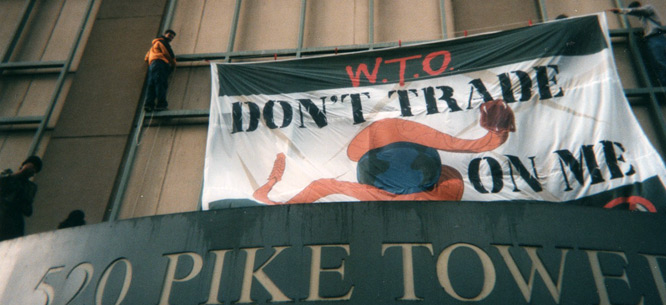Not Your Parents’ Protest
Not Your Parents’ Protest
The 1999 WTO protests brought together a unique coalition of trade unionists, environmentalists, and direct actionists, governed by a spirit of respect and mutual support rarely seen before—or replicated since.

The unexpected size and militance of last year’s mobilization against the World Trade Organization (WTO) in Seattle, the police attack on overwhelmingly nonviolent demonstrators, the tear gas in the air, all invite comparisons with the movements of the sixties, especially the antiwar movement of the late sixties and early seventies. It is tempting for those of us old enough to remember that period to see in the Seattle mobilization, and whatever may follow it, an opportunity to replay the movements of the sixties. In fact there are major differences between the two, and many of those differences are to the advantage of the new movement.
The most important difference is that movements of the sixties, especially the antiwar movement, were directed against the state; the Seattle mobilization was directed against the global corporations. In the sixties, the civil rights movement blamed the U. S. government for the discrepancy between democratic rhetoric and the denial of the rights of citizens to blacks. The movement demanded that the state ensure equal rights. Many left activists of the sixties understood that the state was intertwined with the corporations; in 1966 Carl Oglesby, then president of the Students for a Democratic Society, described the system that the movement opposed as “corporate liberalism,” and pointed out that liberals in power were pursuing policies designed to protect the interests of corporations. Radical intellectuals traced corporate influences on government policy. But it was the liberals who were the focus of the movement’s attack.
The enmity of sixties radicalism to the liberal state had some unfortunate side effects. Though at first Oglesby and others carefully distinguished between the liberal rhetoric used by the state to manipulate popular consent and the authentic liberal values of reformers, as the war in Vietnam expanded and anger at the government rose, these distinctions tended to slip away. Antiwar activists began to use “liberal” as a term of abuse and to measure their own radicalism by how far they had moved from their own recently liberal politics. The movement’s tendency to cast radicalism and liberalism as polar opposites made alliances between radicals and liberals difficult. But despite these problems, the movement’s view of the liberal state as the enemy made sense. The war in Vietnam was being conducted by liberals in power who defended it with their own cold war rhetoric. One of the contributions of the movements of the sixties was to expose the hollowness of cold war liberalism.
The coalition that opposed the WTO in Seattle was held together by a common perception of global corporations as the main threat to environmental standards, labor and human rights, and to democracy generally. There were differences among the various constituencies in Seattle over how far the critique of the corporations should go, and what solutions should be proposed to growing corporate...
Subscribe now to read the full article
Online OnlyFor just $19.95 a year, get access to new issues and decades' worth of archives on our site.
|
Print + OnlineFor $35 a year, get new issues delivered to your door and access to our full online archives.
|





